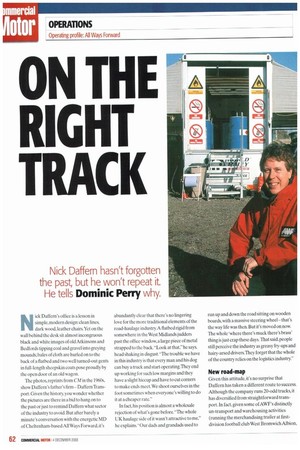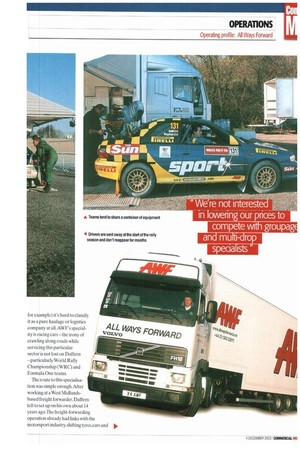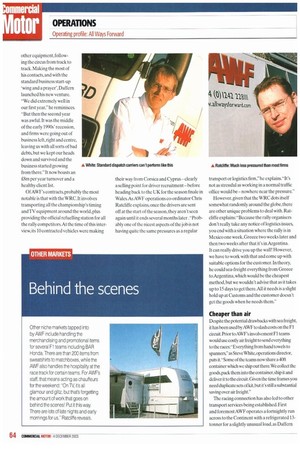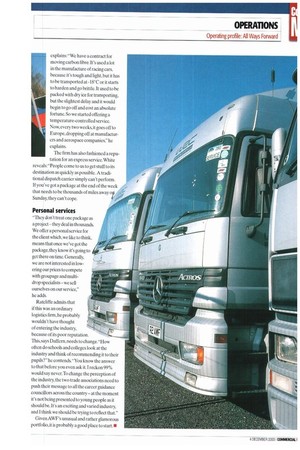ON THE RIGHT TRACK
Page 62

Page 63

Page 64

Page 65

If you've noticed an error in this article please click here to report it so we can fix it.
Nick Daffern hasn't forgotten the past, but he won't repeat it.
He tells Dominic Perry why.
Nick Daffem's office is a lesson in simple, modern design: clean lines. dark wood, leather chairs.Yet on the wall behind the desk sit almost incongruous black and white images of old Atkinsons and Bedfords tipping coal and gravel into greying mounds; bales of cloth are hurled on to the hack of a flatbed and two well turned-out gents in full-length sheepskin coats pose proudly by the open door of an old wagon.
The photos, reprints from CM in the 1960s. show Daffem's father's firm — Daffem Transport. Given the history you wonder whether the pictures are there in a bid to hang on to the past or just to remind Daffem what sector of the industry to avoid. But after barely a minute's conversation with the energetic MD of Cheltenham-based All Ways Forward, it's abundantly clear that there's no lingering love for the more traditional elements of the road-haulage industry.A flatbed rigid from somewhere in the West Midlands judders past the office window, a large piece of metal strapped to the back."Look at that," he says, head shaking in disgust."The trouble we have in this industry is that every man and his dog can buy a truck and start operating. They end up working for such low margins and they have a slight hiccup and have to cut comers to make ends meet. We shoot ourselves in the foot sometimes when everyone's willing to do it at a cheaper rate."
In fact, his position is almost a wholesale rejection of what's gone before. "The whole UK haulage side of it wasn't attractive to me." he explains. -Our dads and grandads used to run up and down the road sitting on wooden boards, with a massive steering wheel —that's the way life was then. But it's moved on now. The whole 'where there's muck there's brass' thing is just crap these days. That said, people still perceive the industry as greasy fry-ups and hairy-arsed drivers. They forget that the whole of the country relies on the logistics industry."
New road-map
Given this attitude, it's no surprise that Daffem has taken a different route to success. Although the company runs 20-odd trucks, it has diversified from straightforward transport. In fact, given some of AWF's distinctly un-transport and warehousing activities (running the merchandising trailer at firstdivision football club West Bromwich Albion. for example) it's hard to classify it as a pure haulage or logistics company at all. AWF's speciality is racing cars — the irony of crawling along roads while servicing this particular sector is not lost on Daffern — particularly World Rally Championship (WRC) and Formula One teams.
The route to this specialisation was simple enough.After working at a West Midlandsbased freight forwarder,Daffem left to set up on his own about 14 years ago.The freight-forwarding operation already had links with the motorsport industry,shifting tyres, cars and other equipment, followMg the circus from track to track. Making the most of his contacts, and with the standard business start-up 'wing and a prayer', Daffern launched his new venture. "We did extremely well in our first year." he reminisces, "But then the second year was awful. It was the middle of the early 1990s' recession, and firms were going out of business left, right and centre, leaving us with all sorts of bad debts, but we kept our heads down and survived and the business started growing from there." It now boasts an am per year turnover and a healthy client list.
Of AWF's contracts. probably the most notable is that with the WRC. It involves transporting all the championship's timing and TV equipment around the world,plus providing the official refuelling station for all the rally competitors.At the time of this interview, its 10 contracted vehicles were making their way from Corsica and Cyprus -clearly a selling point for driver recruitment — before heading back to the UK for the season finale in Wales. As AWF operations co-ordinator Chris Ratcliffe explains, once the drivers are sent off at the start of the season. they aren't seen again until it ends several months later ."Probably one of the nicest aspects of the job is not having quite the same pressures as a regular transport or logistics firm," he explains. "It's not as stressful as working in a normal traffic office would be — nowhere near the pressure."
However, given that the WRC dots itself somewhat randomly around the globe, there are other unique problems to deal with. Ratcliffe explains: 'Because the rally organisers don't really take any notice of logistics issues, you end with a situation where the rally is in Mexico one week. Greece two weeks later and then two weeks after that it's in Argentina. It can really drive you up the wall! However, we have to work with that and come up with suitable options for the customer. In theory, he could sea-freight everything from Greece to Argentina, which would be the cheapest method, hut we wouldn't advise that as it takes up to 15 days to get there. All it needs is a slight hold up at Customs and the customer doesn't get the goods when he needs them."
Cheaper than air
Despite the potential drawbacks with sea freight, it has been used by AWF to slash costs on the Fl circuit, Prior toAWFs involvement Fl teams would use costly air freight to send everything La the races:"Everything from hand towels to spanners,"asSteveWhite,operations director. puts it "Some of the teams now share a 40ft container which we ship out there. We collect the goods, pack them into the container,shipit and deliver it to the circuit.Given the time frames you need duplicate sets of kit, but it's still a substantial saving over air freight."
The racing connection has also led to other transport services being established. First and foremost AWF operates a fortnightly run across to the Continent with a refrigerated 13tonner for a slightly unusual load, as Daffern explains:"We have a contract for moving carbon fibre. It's used a lot in the manufacture of racing cars. because it's tough and light, but it has to be transported at I8°C or it starts to harden and go brittle. It used lobe packed with dry ice for transporting, but the slightest delay and it would begin to go off and cost an absolute fortune. So we started offering a temperature-controlled service. Now,every two weeks.it goes off to Europe. dropping off at manufacturers and aerospace companies," he explains.
The firm has also fashioned a reputation for an express service. White reveals:"People come to us to get stuff to its destination as quickly as possible. A traditional dispatch carrier simply can't perform. If you've got a package at the end of the week that needs to be thousands of miles away o Sunday, they can't cope.
Personal services
"They don't treat one package as a project— they deal in thousands. We offer a personal service for the client which,we like to think, means that once we've got the package, they know it's going to get there on time. Generally, we are not interested in lowering our prices to compete with groupage and multidrop specialists—we sell ourselves on our service," he adds.
Ratcliffe admits that if this was an ordinary logistics firm. he probably wouldn't have thought of entering the industry, because of its poor reputation. This, says Daffern, needs to change. -How often do schools and colleges look at the industry and think of recommending it to their pupils?" he contends."You know the answer to that before you even ask it. I reckon 99% would say never.To change the perception of the industry, the two trade associations need to push their message to all the career guidance councillors across the country — at the moment it's not being presented to young people as it should be. It's an exciting and varied industry, and !think we should be trying to reflect that."
Given AWF's unusual and rather glamorous portfolio. it is probably a good place to start. •
































































































































































































